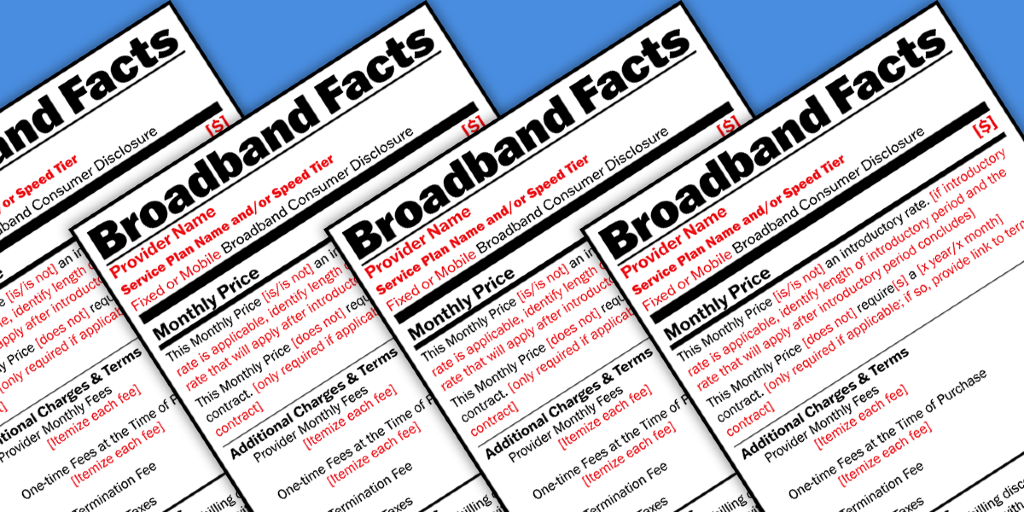WASHINGTON, Oct. 24, 2025 – Public interest advocates urged the Federal Communications Commission this week to preserve transparency measures designed to help consumers compare broadband plans.
In a Tuesday meeting with Chairman Brendan Carr’s office, Harold Feld and John Bergmayer of Public Knowledge pushed back on the FCC’s proposal to scale back disclosure requirements for Internet service providers, set for a vote on Oct. 28.
By “allowing the erosion of consumer protections, the FCC could create a permission structure for ISPs to continue to act without accountability,” Feld and Bergmayer argued. “Internet service providers should not be given free rein to chip away at affordability and the stopgaps the commission has put in place to protect consumers.”
The rules under review were adopted by the FCC in 2022 after Congress directed the agency to create standardized “nutrition labels” displaying prices, speeds, fees, and other key details of Internet plans.
With new leadership at the FCC, the commission is now proposing to revise or remove several of those requirements.
Carr said the rulemaking was intended to refine the FCC’s consumer disclosure framework. In a blog post previewing the FCC’s October meeting, he wrote that the agency aims to “separate the wheat from the chaff.”
“We want consumers to get quick and easy access to the information they want and need to compare broadband plans (as Congress has provided) without imposing unnecessary burdens,” Carr wrote.
Feld and Bergmayer were particularly concerned with the FCC’s proposal to “eliminate the requirement that providers itemize discretionary, recurring monthly fees” which represent the costs they choose to pass through to consumers and which vary by consumer location.
“Broadband consumer labels are meant to provide the public with a clear understanding of what they are paying for and ensure no costs are obscure or misleading,” Feld and Bergmayer said.
The FCC’s notice of proposed rulemaking, they warn, “ask[s] how the label can be improved, but focuses solely on weakening requirements.”
Broadband industry and advocacy groups also met separately with staff from the offices of Commissioners Anna Gomez and Olivia Trusty this week to press their views on the agency’s plan.
Representatives from New America’s Open Technology Institute, the Benton Institute for Broadband & Society, and the National Digital Inclusion Alliance met with Trusty’s office on Monday and Gomez’s office on Tuesday to reiterate their opposition to eliminating label requirements.
The groups told FCC staff that striking the requirement that providers itemize discretionary recurring fees “would invite mischief, lead to bill shock, and undermine competition.”
They argued that even apart from label design, providers should be required to give customers an itemized breakdown of charges and fees before completing a transaction, ensuring that pricing was transparent at the point of sale.
One industry group, however, expressed strong support for the rollback.
In meetings with staff from Gomez’s and Carr’s offices, the Wireless Internet Service Providers Association urged the FCC to drop rules it views as unnecessary or duplicative, including the requirement that providers maintain archived labels and disclose machine-readable data.
WISPA also asked the FCC to make the labeling regime voluntary for smaller providers.
“Smaller broadband providers, such as those within WISPA’s membership, should not be required to expend the time, cost and effort to change their current broadband labels,” Louis Peraertz, vice president of policy for WISPA, wrote.

